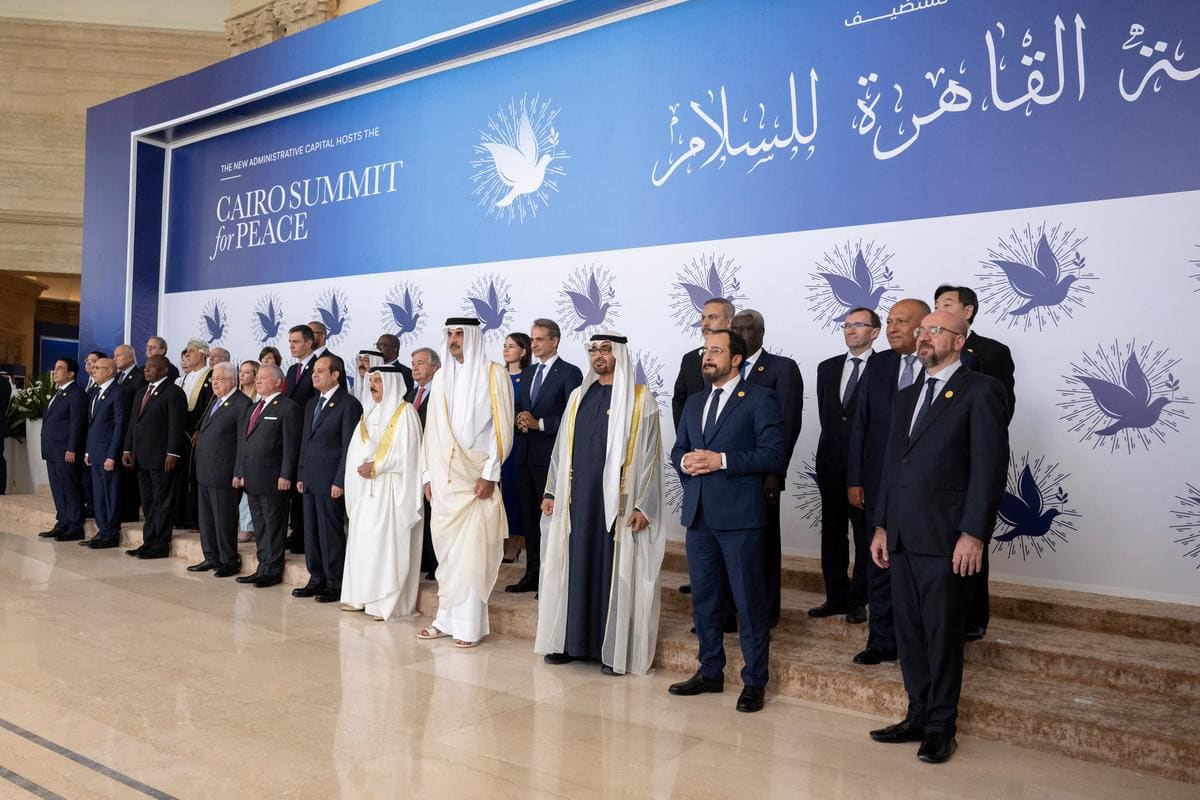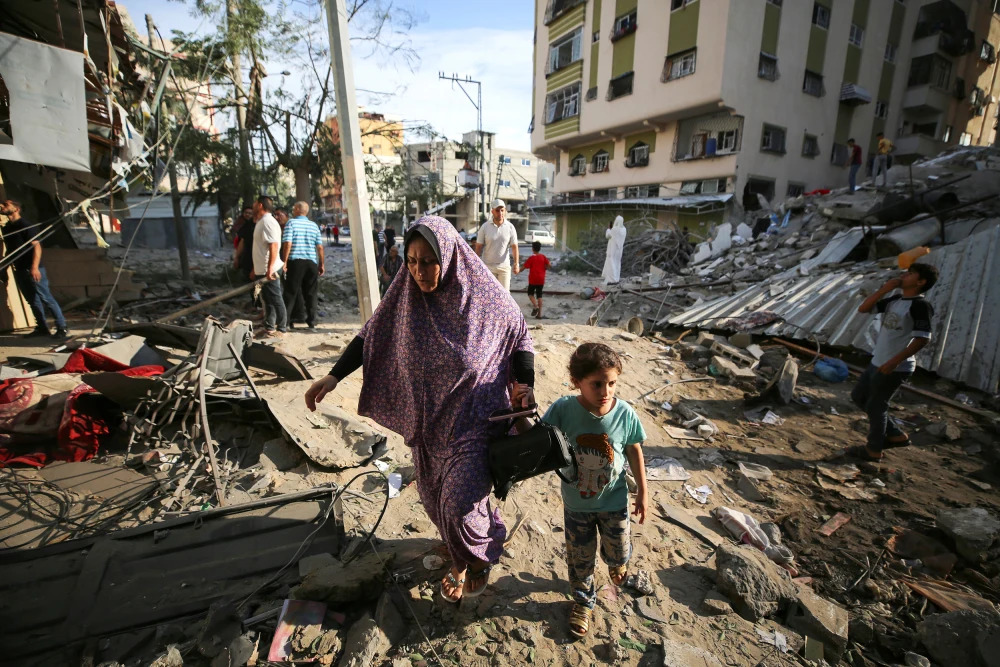
Reuters via UAE Presidential Court
23-10-2023 الساعة 10 صباحاً بتوقيت عدن
Jason Law (South24)
On Saturday, world leaders met at a one-day conference dubbed the “Cairo Summit for Peace”, to call for peace and discuss solutions to the ongoing Israel-Palestine conflict and the humanitarian crisis that have emerged as a result, with a focus on preventing regional escalation into a wider war.
Held at the initiative of Egyptian President Abdel Fattah el-Sisi, the summit was attended by heads of state from Palestine, Jordan, the U.A.E., Bahrain, Qatar, Kuwait, Iraq, Italy, Spain, Greece, Cyprus, and South Africa. Also in attendance were foreign ministers and secretaries from Turkey, Germany, France, Japan, the U.K., Norway, Russia, and China, along with other officials from the United Nations and European Union.
Notably, no representatives from the U.S.A, Israel, or Iran were present despite all being key players in the overall crisis, as reported by Politico.
The meeting sought to discuss ways to de-escalate the continuously escalating war between Israel and Hamas, which as of October 22nd has killed at least 4,651 Palestinians in the Gaza Strip, according to Palestinian news agency Wafa, and 1,400 Israelis since Hamas launched its deadly attack on Israel on October 7th.
Leaders also hoped to alleviate the humanitarian crisis by lining out a plan to ensure the safe delivery of aid to Gaza, where 2.3 million Palestinian people have been deprived of water, food, medicine, and fuel, whilst under the constant threat of bombardment from Israeli airstrikes and other attacks.
Additionally, the summit aimed to reach a ceasefire agreement between the two main warring parties, to mitigate growing fears that the situation will expand into a wider regional conflict.
The Summit
President el-Sisi, as the host of the summit, used his opening remarks to highlight the current focus of the world’s attention on the region, stating “that all the peoples of the world, not only the peoples of this region, are following with eyes wide open our stances at this momentous and historical moment”.
His speech condemned “the targeting, killing and intimidation of peaceful civilians” while restating Egypt’s “call to provide international protection for the Palestinian people and the innocent civilians.”
He highlighted Egypt’s efforts to deliver humanitarian aid through the open Rafah land crossing, which was obstructed by Israeli shelling of the Palestinian side. He stated that he had agreed with “the American President to operate the crossing on a sustainable basis, under the supervision of and coordination with the United Nations, the UNRWA and the Palestinian Red Crescent.”
While the conference was beginning, 20 trucks carrying aid entered the Gaza strip for the first time through the Rafah border crossing, as reported by Al Jazeera. More than 200 trucks had previously been positioned near the border awaiting entry.
President el-Sisi went on to vehemently reject the forced displacement of Palestinians into Egypt’s Sinai Peninsula desert region, stating that such a move would “mark the last gasp in the liquidation of the Palestinian cause, shatter the dream of an independent Palestinian state, and squander the struggle of the Palestinian people.”
Jordan’s King Abdullah used his opening speech to reiterate the point made by Egypt, adding that the forced or internal displacement of Palestinians “is a war crime according to international law, and a red line for all of us.” Jordan already hosts the largest numbers of displaced Palestinians from previous wars in the Middle East.
He expressed outrage and grief at the acts of violence waged against citizens in Gaza, The West Bank, and Israel, though he said, "The message the Arab world is hearing is that Palestinian lives matter less than Israeli ones” and “All civilian lives matter!”

People walk among debris caused by Israeli airstrikes in Gaza City. Majdi Fathi/NurPhoto via Getty Images.
He stressed that the consequences of continued international apathy and inaction will be catastrophic “on us all”, pointing to the absence of international accountability. He delivered the speech in English, explicitly stating that the message is “to our friends from Europe and the world who join us here today.”
“It is our duty as the international community to do whatever it takes to restart a meaningful political process that can take us to a just and sustainable peace on the basis of the two-state solution” he said.
UN Secretary-General Antonio Guterres used his speech at the peace summit to reiterate his call for the sustained delivery of humanitarian aid to Gaza, and referred to the two-state solution as “the only realistic foundation for a true peace and stability.” He also called for “international action to avoid the conflict from expanding to the wider region,” as reported by UN News.
President of the Palestinian Authority Mahmoud Abbas delivered a speech condemning “Israel’s barbaric aggression” and called on the international community to assume its responsibilities to protect the Palestinian people, and for Israel to “to open humanitarian corridors to bring in relief and medical supplies, and to provide water and electricity”. He also requested “the release of all civilians, prisoners, and detainees” and the implementation of a two-state solution under international guarantees, reports the Palestine News & Info Agency.
The foreign ministers of Germany and the UK urged the IDF to show restraint, while Italy stressed the need for de-escalation. France highlighted the importance of opening a humanitarian corridor in negotiating a ceasefire.
Fears of a Wider Conflict
An overarching concern of the peace summit was the fear that the Israel-Palestine conflict could escalate into a wider conflict involving additional factions or even other nations.
Following Hamas’s incursion into Israel on October 7th, and Israeli Prime Minister Benjamin Netanyahu’s subsequent declaration of war against Hamas, other militant groups in the region have made hostile movements against Israel.
Lebanese Shia Islamist militant group Hezbollah have exchanged artillery fire and other attacks with Israel multiple times across their shared border, after the Iran-backed militants declared they would “stand in solidarity” with the Palestinian people. Israel has stationed troops on the Lebanese border and evacuated a border city on Friday, October 20th after three residents were injured by crossfire, reports AP News. Six Hezbollah fighters were killed on 21st October in their highest death toll since the current violence began.
On 10th October, mortars were fired from Syria at Israel’s Golan Heights, to which Israel responded with artillery strikes. On October 12th and 14th, Israeli Defense Forces fired on Damascus and Aleppo International Airports in Syria, injuring five. On Wednesday the 18th, a drone mildly injured US troops based in Syria, and another hit drone hit the Ain al-Asad airbase in Iraq, causing minor damage according to American officials. The Guardian writes that Western officials say these attacks could indicate regional “spillover” from the Israel – Hamas conflict.
On Thursday, 19th October, as reported by South24 Center, the U.S. Navy destroyer USS Carney intercepted three land attack cruise missiles over the northern Red Sea that had been launched by Iranian-backed Houthis in Yemen. Israel Public Broadcasting (Kan News) confirmed that the rockets were launched “in solidarity with [the] Palestinian people”. The missile attack followed a threat by Houthi leader Abdulmalik Al-Houthi nine days prior to launch missiles and drones against Israel in support of Palestinians.
Responding to the incidents, Pentagon spokesman Brigadier General Patrick Ryder told reporters: “Right now, this conflict is contained between Israel and Hamas, and we’re going to do everything we can to ensure deterrence in the region, so that this does not become a broader conflict.”
Israel, following its two weeks of bombardment of the Gaza strip, is now preparing for a ground assault to ‘root out’ Hamas from the enclave, having amassed tanks and troops near Gaza’s perimeter. Speaking of the offensive, Israeli military spokesman Rear Admiral Daniel Hagari said “We are continuing the war against Hamas and ready for the next stage of the war”.
Tensions could be further escalated by an Israeli ground invasion. The Royal United Services Institute (RUSI) of London hypothesizes that in the event of such a move, groups who define themselves by their opposition to Israel—such as the Palestinian factions, Hezbollah, Iran-backed groups in the region, and even Iran itself—could be drawn into a larger conflict.
One week ago, on 15th October, Iranian Foreign Minister Hossein Amir-Abdollahian told Aj Jazeera that “If the Zionist entity [Israel] decides to enter Gaza, the resistance leaders will turn it into a graveyard of the occupation soldiers,”. According to sources of American news agency Axios, the foreign minister declared that if Israel proceeds with its ground invasion, “Iran will have to respond”.
Outcomes of the Summit
The goals of the summit were to ensure a humanitarian corridor and delivery of aid for the people of Gaza, to make progress towards a ceasefire agreement, and to de-escalate the situation to prevent a wider conflict. Though such a peace conference is a step in the right direction, it appears to have borne no fruit other than highlighting the chasm that exists between ideas of how peace can be achieved.
Veteran Lebanese politician Walid Jumblatt pointed out that nations central to the overall conflict were not present at the Cairo summit, saying of the attendant leaders “They don’t have any influence. The three players are Israel, Iran and America.”
Jordan and Egypt were two of the more prominent speakers at the summit and expressed harsh criticism of Israel, despite longstanding peaceful ties with the primarily Jewish nation. According to AP News, two Egyptian officials stated that ties with Israel “have reached a boiling point”.
Assistant Professor of Middle East studies at Doha’s Hamad Bin Khalifa University, Marc Owen Jones, told Al Jazeera “I can’t see, without Israel at the table, that there’s going to be a sufficient degree of political clout here to stop Israel’s bombing of Gaza.” He claimed the opening statements of Arab leaders amounted to “political grandstanding” and said the impact of the summit on ground developments would be “limited”.
Following the summit, Antonio Guterres took to X, formerly Twitter, to say that the ‘Middle East’ had appealed for “immediate, unrestricted & sustained humanitarian aid for civilians in Gaza, immediate & unconditional release of all hostages [and] immediate & dedicated efforts to prevent the spread of violence, which is increasing the risk of spillover.”
However, Reuters writes that leaders and foreign ministers failed to agree on a joint statement. Western leaders seemed focus on the securing of humanitarian aid, while Arab and Muslim nations’ attention was on an end to Israel’s offensive and the prevention of Palestinian displacement. Reuters also reports that diplomats failed to explore how to stop escalation to a wider regional war, due to diplomatic sensitivity around calls for a ceasefire and the mention of Hamas’s attack or Israel’s ‘right to defend itself’.
One positive outcome of the summit, and an area all present leaders seemed to align on, was the imminent need for the provision of aid. The twenty aid trucks that entered on Saturday are a step in the right direction, though Jeremy Hopkins, Representative of the UN Children’s Fund (UNICEF) in Egypt described them as a “drop in the ocean” when considering the immense needs of those trapped in Gaza.
Jason Law
English Editor at South24 Center for News and Studies